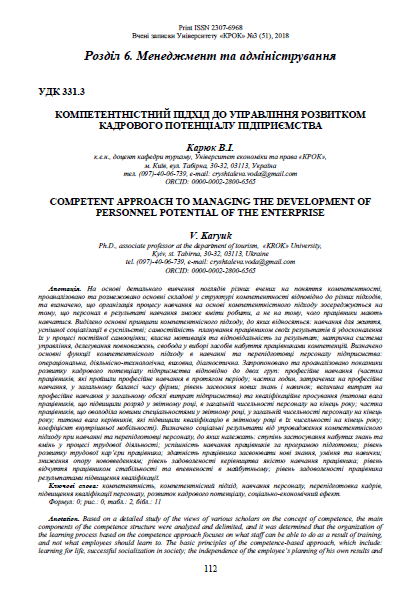COMPETENT APPROACH TO MANAGING THE DEVELOPMENT OF PERSONNEL POTENTIAL OF THE ENTERPRISE
DOI:
https://doi.org/10.31732/2663-2209-2018-51-112-118Keywords:
competence, competence approach, personnel training, retraining of personnel, personnel development, human resource development, socio-economic effectAbstract
Based on a detailed study of the views of various scholars on the concept of competence, the main components of the competence structure were analyzed and delimited, and it was determined that the organization of the learning process based on the competence approach focuses on what staff can be able to do as a result of training, and not what employees should learn to. The basic principles of the competence-based approach, which include: learning for life, successful socialization in society; the independence of the employee‘s planning of his own results and their improvement in the process of constant self-assessment; own motivation and responsibility for the result; matrix management system, delegation of authority, freedom in choosing how workers gain competencies. The main functions of the competence-based approach in training and retraining of enterprise personnel are identified: operational, activity-technological, educational, diagnostic. The indicators of the development of personnel potential of the enterprise in accordance with the two groups were proposed and analyzed: vocational training (the proportion of employees who completed vocational training during the period; the proportion of hours spent on vocational training in the total time balance of the company; the level of assimilation of new knowledge and skills; the amount of expenses on vocational training in the total amount of expenses of the enterprise) and qualification promotion (the proportion of workers who increased the discharge in the reporting year in the total number of staff at the end of the year, the proportion of workers who mastered the new specialties in the reporting year, the total number of staff at the end of the year, the proportion of managers who have improved their skills in the reporting year in their number at the end of the
year, the coefficient of internal mobility). The social results from the introduction of the competence approach in the training and retraining of personnel are defined, which include: the degree of application of acquired knowledge and skills in the process of labor activity; the success of employee training for the training program; the level of development of the employee's career; the employee‘s ability to absorb new knowledge and skills; reduced resistance to innovation; the level of satisfaction with the management of the quality of employee training; level of employee feeling of stability and confidence in the future; employee satisfaction with the results of advanced training.
Downloads
References
Ибрагимов Г. И. Компетентностный подход в профессиональном образовании. Educational Technology & Society : журнал. Taiwan, 2007. № 10 (3) С. 361-365.
Спрудэ К. А. Оценка компетенций в разработке системы персонал-технологий организации. URL : http://webcache.googleusercontent.com (дата звернення 10.08.2018).
Дэвид К. МакКлелланд. Понятие компетенции. URL : http://www.timetogo.ru/articles-/what_is_competency.htm (дата звернення 10.08.2018).
Антонюк Л.Л. Компетентністний підхід у вищій освіті: світовий досвід навч. пос. Київ : КНЕУ, 2016.66 с.
Бояцис Р. Компетентный менеджер. Модель эффективной работы : научное пособие. Москва : HIPPO, 2008. 352 с.
Лейко С.В. Поняття «компетенція» та «компетентність»: теоретичний аналіз. Педагогічний процес: теорія і практика : зб. наук. пр. – 2013. – Вип. 4. URL : http://pptp.org.ua/images/2013/04/15.pdf.pdf (дата звернення 10.08.2018).
Преображенська О. С. Формування компетенцій корпоративного управління на основі знань підприємства: автореф. дис. на здобуття наук. ступеня канд. екон. наук: спец. 08.00.04 «Економіка та управління підприємствами (за видами економічної діяльності)» Харків, 2011. 22 с.
Сазоненко Г.С. Компетентність у системі неперервної освіти: акмеологічна модель: наук.-метод. посіб. Макарів : Софія, 2013. 411 с.
Селевко Г. Компетентности и их классификации. URL : http://matem.uspu.ru/i/inst/math/subjects/04OPDMAT_MAT2007D02.pdf (дата звернення 10.08.2018).
Чуланова О.Л. Основные риски при внедрении модели компетенций в управление персоналом организации. Современные проблемы и перспективы экономического развития и управления: сб. научн. тр. Сургут: ИЦ СурГУ, 2014. С.174-181.
Лановенко А.О. Компетентнісний підхід у професійній підготовці фахівців. Проблеми та перспективи формув. нац. гуманіт.-техн. еліти: зб. наук. пр Харків : Нац. техн. ун-т «ХПІ, 2011. Вип. 29. С. 44–50.


